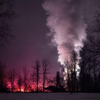Rauch will lead others in turning trash into art
— Photo from Emily Constance Rauch
This collage, created by Renssealerville artist Emily Constance Rauch and titled “After the Storm,” is made up of marine plastics that Rauch collected while walking along a beach. Rauch will do something similar on a much larger scale with “Merz Month,” a project that will use refuse collected by students and other community members.
RENSSELAERVILLE — The Puffin Foundation has awarded a grant to Rensselaerville artist Emily Constance Rauch, who will use it to work on a large collage made up of everyday refuse, collected by students and other community members.
The idea, she told The Enterprise this week, came to her when she was visiting a large art-supply retailer and saw “aisles of junk, mostly plastic that would end up in the waste stream.”
Rauch said she felt that by using waste she could foster conversation about what people choose to throw away and how it can be repurposed.
A recently-retired art teacher, she said, “I wanted to let kids know that art can be made without shopping.”
It also corresponds with the style promoted by one of her favorite artists, Kurt Schwitters, a German Dadaist who specialized in creating work from found objects, an approach he termed Merz, which is why Rauch is naming her new project “Merz Month.”
“Kurt Schwitters has always been one of my favorite artists since I first saw his work back when I was in high school. He was so goofy and joyful,” Rauch said, noting that he once attempted to create art out of porridge.
In keeping with a genre of art that sees itself as anti-rational, Rauch made clear in her application to the Puffin Foundation — a not-for-profit that “has sought to open the doors of artistic expression by providing grants to artists and art organizations who are often excluded from mainstream opportunities due to their race, gender, or social philosophy,” according to its website — that, although she has previously used marine plastics in her work and will be using refuse for her current project, it is “not environmental activism,” despite the climate awareness it might inspire.
“I feel it is OK to concentrate on the formal aspects of abstraction without a political agenda,” she wrote in the grant synopsis.
Because she doesn’t know what exactly will be used in the project, Rauch said it’s hard to predict how it will look, but she expects it to be a wall-mounted piece, roughly 9 to 12 feet wide and 6 feet tall.
The grant covers about two weeks’ worth of pay, which Rauch said will let her work “without the little worrying voices that I should be out in the world earning money.”
Although she thinks that retiring from full-time education last year was the right decision, so that she can focus on her art while earning money as a substitute teacher, Rauch will be incorporating her teaching ability into the project.
The piece itself is expected to be put together in November, and, afterward, Rauch hopes that it will be exhibited in multiple venues where she will also hold workshops on collage art in general while showing her earlier works.
“I notice that, if I am out of a school environment for too long, I miss it,” she said.

